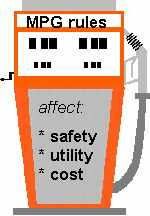CAFE background
The Corporate Average Fuel Economy (CAFE) program was enacted in 1975, intended to help conserve energy. The program requires each automaker to meet a government-set mileage targets ("CAFE standards") for all cars sold in the U.S. each year, and to meet another separate target for light trucks sold. Gas mileage for cars and trucks have both increased dramatically over the past 20 years -- due largely to market forces. But the CAFE program has tended to limit consumer choice, force vehicle downsizing and increase safety risks.
 CVC's Issue Brief is a
good primer on the CAFE program, including What Is It and How
Has It Worked? and frequently asked questions and
answers.
CVC's Issue Brief is a
good primer on the CAFE program, including What Is It and How
Has It Worked? and frequently asked questions and
answers.
The CAFE program has been the subject of frequent controversy in over the past 25 years, including debates over oil imports, safety, jobs and the environment. Our CAFE history provides a look back at some of the significant events in this program, from the early 1970's through today.
Higher CAFE standards for cars in the late 1970's and early 80's led to the virutal extinction of full-size passenger cars and station wagons, and pushed many consumers into the light truck market. A recent newspaper analysis showed the size-weight gap between today's cars and light trucks is due largely to CAFE requirements, and no larger than the large-small car differential of the 1970's.